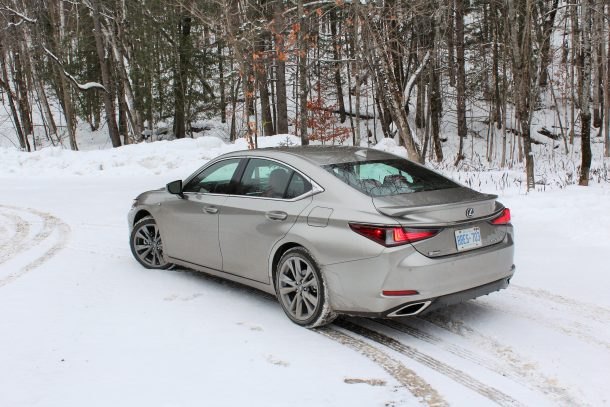Livelier Rear Axle Coming to Lexus ES?

Far be it for us to foist accolades on a modern production car, but the current-generation Lexus ES is a taut, well-behaved sedan that feels like a quality item. It’s also front-wheel drive, which might be a no-go proposition in your books.
If those rear wheels aided in propelling the ES forward, would it change the equation? Because that’s what Lexus might have in mind. It’s a big might.
This tidbit of news, garnered from Lexus Enthusiast via Motor Authority, comes after the test drive of an ES300h prototype test drive offered to Japanese media. The vehicle in question came equipped with all-wheel drive.
Before you get too excited, it’s worth knowing that the rear axle of the ES300h driven in Japan has no mechanical connection to the engine. This is an E-axle affair, where a battery supplies power to an electric motor that motivates the rear wheels independent of the front wheels. It’s become an increasingly common presence in Toyota products of late, found on the RAV4 Hybrid, the Lexus UX, and even the Prius, which recently sought to boost its flagging popularity with a feature coveted in Snow Belt regions.
This is not a feature that offers drift opportunities and a 50:50 torque split; rather, it works up to a set speed to simply get a vehicle moving in low-grip conditions. Power supplied to the rear axle pales in comparison to even a hybrid’s downsized powerplant.
That said, there’s precious few details about the ES300h prototype’s AWD setup. The brand could choose to pack on the power in the aims of fielding a green sports sedan, or not. You won’t find a hybrid ES with the F Sport package, not that that addition brings AWD into the picture.
Nor is the ES or its Toyota Avalon sibling a very sporting vehicle in hybrid guise. Competent, smooth, and efficient, yes, but hardly a powerhouse. Adding ponies to the rear axle could help the model kick up its heels a bit, but given Toyota’s product direction, it would seem that any E-axle inclusion would lean more towards all-weather capability and general appeal, not thrills.
Lexus itself poured icy water on speculation of an AWD ES, claiming in an email to Motor Authority that the Lexus sedan was being employed as a test mule for electric drive technology. That’s still no guarantee that a future E-axle setup won’t appear in the large-ish midsizer.
Through the end of October, ES sales are up 7.4 percent in the U.S.
[Image: Steph Willems/TTAC]

More by Steph Willems
Latest Car Reviews
Read moreLatest Product Reviews
Read moreRecent Comments
- V8fairy Not scared, but I would be reluctant to put my trust in it. The technology is just not quite there yet
- V8fairy Headlights that switch on/off with the ignition - similar to the requirement that Sweden has- lights must run any time the car is on.Definitely knobs and buttons, touchscreens should only be for navigation and phone mirroring and configuration of non essential items like stereo balance/ fade etc>Bagpipes for following too close.A following distance warning system - I'd be happy to see made mandatory. And bagpipes would be a good choice for this, so hard to put up with!ABS probably should be a mandatory requirementI personally would like to have blind spot monitoring, although should absolutely NOT be mandatory. Is there a blind spot monitoring kit that could be rerofitted to a 1980 Cadillac?
- IBx1 A manual transmission
- Bd2 All these inane posts (often referencing Hyundai, Kia) the past week are by "Anal" who has been using my handle, so just ignore them...
- 3-On-The-Tree I was disappointed that when I bought my 2002 Suzuki GSX1300R that the Europeans put a mandatory speed limiter on it from 197mph down to 186mph for the 2002 year U.S models.

































Comments
Join the conversation
Toyota/Lexus, Honda, Hyundai, Volkswagen, KIA, and. Others continues to thank Guangzhou-Guadalajara Motors (GM) and Hackett-led Ford for nearly completely ceding this space to them, now, and in future years (when sedan sales march back up).
If it isn't RWD based, it's dead to me. Never.